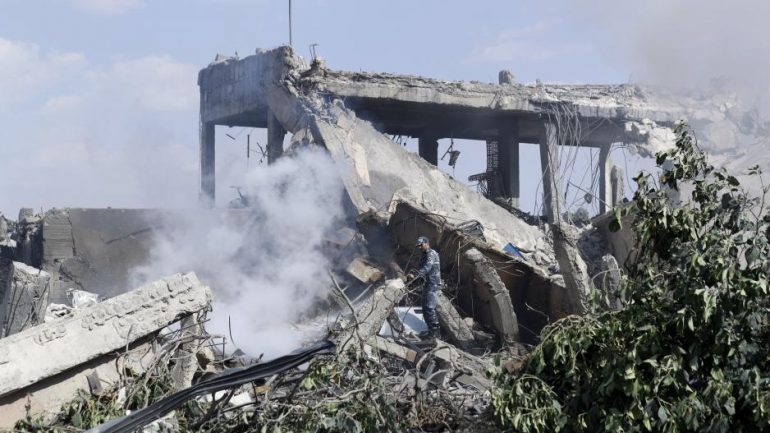With bated breath, the world public is watching the developments in Syria after the joint attack of the USA, Britain and France on positions of the Assad regime related to the use of chemical weapons.
US Vice President Mike Pence has said that Syria will have to "pay the price" if its armed forces carry out new chemical weapons attacks. During the Summit of American States in Lima, Peru, Pence said that President Donald Trump "made it clear that the United States is ready to continue this effort to restore the deterrent to the Syrian regime and the "His supporters know that there will be a price to pay if chemical weapons are used again against men, women and children."
Israeli Prime Minister Benjamin Netanyahu yesterday voiced support for US, French and British incursions into Syria, saying they were aimed at countering the alleged use of chemical weapons by the Syrian regime.
"A year ago, I expressed my full support for Israel's decision by POTUS (President of the United States) Trump to take a stand against the use and proliferation of chemical weapons. "President Trump's decision and Israel's support remain unchanged," Denaniah said, according to a Twitter post.
According to the Israeli Prime Minister, the three Western countries "have shown that their commitment is not limited to declarations of principle."
French President Emmanuel Macron has told his Turkish counterpart Recep Tayyip Erdogan that he wants to step up co-operation between their countries in the coming days, seeking a comprehensive solution for Syria, as announced by the office of the French head of state.
The French president thanked the Turkish president for his statements and his support for the US, French and British air strikes on Syria, the Elysee said in a statement issued after their telephone conversation.
Late in the evening, Erdogan also spoke with Russian President Vladimir Putin. The two leaders agreed to work together to de-escalate tensions but also to continue efforts to find a political solution to the crisis.
They also agreed to "remain resolute in reducing tensions on the front in Syria and to continue efforts to reach a political solution."
France, Germany, Britain and the United States will hold talks in London on Sunday to discuss their next steps after airstrikes against Syria, according to German Foreign Minister Haiko Maas.
"In London, talks will take place between France, Britain, the United States and (Germany) during which we will coordinate our further actions," Maas told reporters in Berlin, adding that the initiative would be discussed by the NATO Council.
Germany, along with France, will try to boost a new effort at the international level with the aim of achieving a permanent ceasefire in Syria, the German minister added.
"We will work together with France to establish an international body of influential states that can provide a new impetus to the political process," Maas said, adding that Germany would use its bilateral ties to ensure that Russia will take a "constructive" stance on the issue.
According to the German newspaper Die Welt, Matisse was the one who - apparently - persuaded the American president not to escalate the attack. Deciding again on a limited military offensive - to avoid a confrontation with Russia.
In essence, the message was this: The operation is identical to that in April 2017, when rockets hit military installations following suspicions of poison gas attacks by the Syrian regime. The United States has now hit fewer installations, although the number of missiles has almost doubled, with no casualties.
Of Europe, only Britain and France took part in the US attack. Germany and the EU have appealed to the UN to find multilateral diplomatic solutions.
"But in essence, the show of strength that President Trump wanted to do is proof of weakness," Die Welt said. Many in Trump's circle apparently wanted a tougher attack - perhaps new security adviser John Bolton was pushing. Eventually, Matisse prevailed - and Trump made an operation that should be understood by Russia as a maximum incitement, not too much as a challenge.
The American president intervenes, but does not want to be involved in the Syrian quagmire in the long run, the German newspaper comments.
"But the limited attacks in Syria have left Putin with no choice but to save the pretexts. He can avoid escalation - and he probably will. But whatever the answer, one thing is for sure:
The United States has said chlorine and sarin gas were used by Syrian government forces in a chemical attack on the Duma, a U.S. military official has said.
"While the information we have is clearer about the use of chlorine, we also have important information about the use of sarin," the official, who did not want to be named, told reporters, citing symptoms cited by several sources.
Sarin gas is a more potent neurotoxic agent, which was used a year ago in Han Seihun, in an attack that had also provoked US retaliation.
